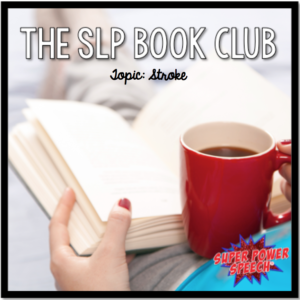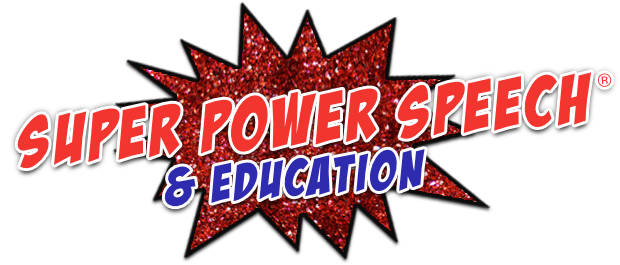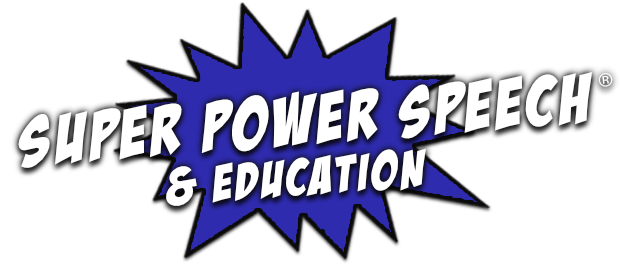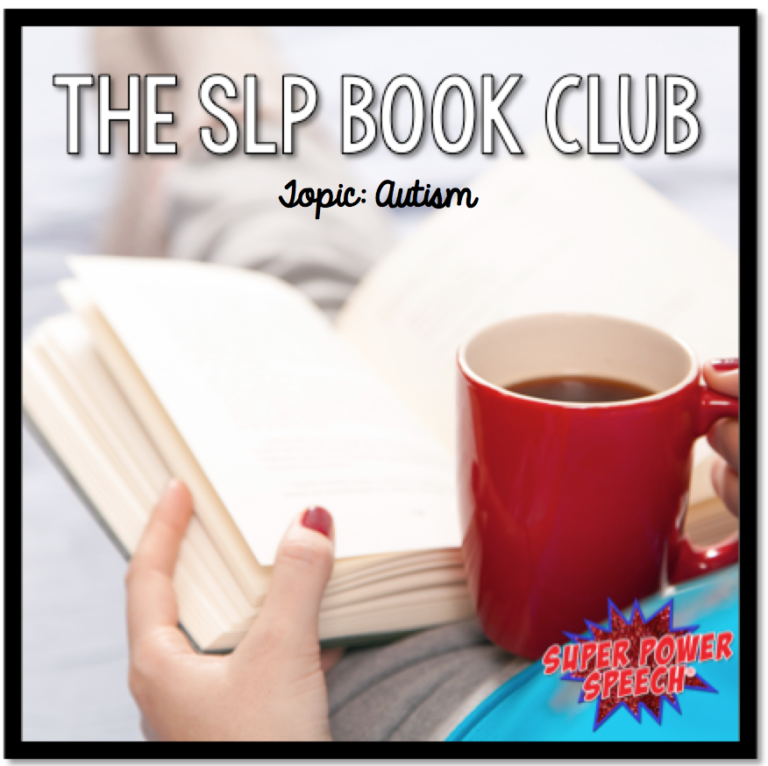SLP Book Club: Stroke

Welcome to the SLP Book Club! This book club has been my dream and my baby as an SLP and a bibliophile. I am so excited to find others out there that want to explore new books with me and discuss them in the comfort of your jammies and slippers!
Disclaimer: Amazon affiliate links included
Let me begin by saying that I felt like I had hit the literary jackpot with these choices. I was able to read each of them in less than two days and absolutely loved them both. Not only were they compelling memoirs, but I felt that I could benefit so much professionally and personally from these books. I loved them.
This month’s topic is very personal for me because my father had a massive left-side stroke in his early 50s. To our amazement, he continued to progress for over a decade. Read more about my dad’s story (and watch his video) here.
Book 1: My Stroke of Insight
Author: Jill Bolte Taylor, PhD
Genre: Memoir
Summary:
One December morning in 1998, Jill Bolte Taylor woke up with a massive headache. Although a brain researcher (specializing in Schizophrenia), it took her some time to realize that she was having a stroke. And from there it took her hours to get help. Eight years post-stroke, Dr. Taylor writes this memoir of how she felt on the day of the stroke as well as her recovery process. She emphasizes the bliss and feelings of being at peace when the right side of her mind took over, as well as the physical pain and helplessness during and after the stroke. She makes the reader both appreciative for their lives as well as longing to have the insight and peacefulness that the author describes.
Overall rating: 5/5
Quotes to ponder:
Although I experienced enormous grief for the death of my left hemisphere consciousness- and the woman I had been, I concurrently felt tremendous relief…. On this special day, I learned the meaning of simply “being”. (page 68)
In the absence of my left hemisphere’s negative judgement, I perceived myself as perfect, whole, and beautiful just the way I was. (Page 71)
I realized that the blessing I had received from this experience was the knowledge that deep internal peace is accessible to anyone at any time. I believe the experience of Nirvana exists in the consciousness of our right hemisphere, and that at any moment, we can choose to hook into that part of our brain. (Page 111)In addition to spending a lot of time conversing with my brain cells, I’m having a big love-fest with the fifty trillion molecular geniuses making up my body. I am so grateful that they are alive and working together in perfect harmony that I implicitly trust them to bring me health. The first thing every morning and the last thing every night, I faithfully hug my pillow, wrap one hand in the other, and consciously thank my cells for another great day. I care enough to say it out loud. “Thank you girls. Thanks for another great day!” (Page 156)
Discussion questions:
- Consider yourself on the morning of the author’s stroke. Would you have reached out for help? If so how?
- How did you feel about the author’s description of her right vs left brain? Based on her descriptions, do you feel more in tune with your (actually “her”) right brain or left brain?
- What is your personal experience with stroke?
Book 2: One Hundred Names for Love
Author: Diane Ackerman
Genre: Memoir
Diane Ackerman and Paul West are both wordsmiths of the highest level. They are accomplished authors and PhDs in literature. When Paul has a stroke (while in the hospital no less!), his vocabulary is reduced to one syllable “Meh”. He cannot read, comprehend language, or swallow safely. He is rated as “severe” in all areas repeatedly by his speech pathologists. In this amazing (true!) love story, Diane chronicles her brilliant husband’s recovery process. Not only is this story truly touching, but the vocabulary, similes, and language are hauntingly beautiful. Both as an SLP and as a person, this book was amazing.
Overall rating: 5/5
Quotes to ponder:
The tests revealed that Paul had a massive stroke, one tailed to his own private hell. In the cruelest of ironies for a man whose life revolved around words, with one of the largest working English vocabularies on earth, he had suffered immense damage to the key language areas of his brain and could no longer process language in any form. (Page 18)We imagine the possible through words. We use words to help us remember who and what we are. we refine how we love in words. We use words to solve problems –partly because a language that offers both the word problem by necessity must include the word solution. Both words include the absorbing idea that a human is an animal who can act upon the world in such a way as to solve a problem. Using those words teaches us that we can master the world by understanding it. The more complex our words, the more layered our story, the more refined our understanding. Some grains of knowing are only possible when passive through the sieve of carefully arranged words. (Page 139)But it was just possible that sophisticated words, the ones he learned as an adult, get processed elsewhere, more like a second language. Doctors, speech therapists, and books on stroke didn’t mention this, but it made sense, and I realized how important that insight might be for his improvement….From then on, I began rethinking Paul’s therapy and creating homework tailed to his lifelong strengths, words and creative ice, exercises with a little fun, a little flair, and not condescending, a sort of madcap Mad Libs that provided some much-needed humor. (Page 193)
Discussion questions:
- What do you think about the traditional speech therapy that Paul was receiving?
- Do you think the author is correct that Paul regained his high-level vocabulary because they were newer words (like a second language)?
- What do you think about Liz? How did she help Paul and Diane during this recovery process?
Are you ready to start discussing? Comment below and make sure to comment on other people’s comments so that we can make this a full discussion! Think of your social skills groups… we need participation and turn-taking to make this work!






I can put myself in the author’s position of having a stroke. I woke up in the middle of the night once to go to the bathroom and couldn’t get out of bed. After what seems like an hour (probably less than 10 minutes in reality) I finally woke my husband up to help me out of bed. He immediately realized I was having a stroke and called 911. I was in total denial of a stroke until I saw the picture of my MRI. So, so scared. And I was truly blessed that I have no lingering side effects from it except occasional word retrieval problems.
Wow! That must have been so scary!! I’m so glad that there are no side effects other than the word retrieval!
Patti,
So glad you had a full recovery (assuming that your word retrieval is not significant), and that your husband knew to get you help right away. I think that, as SLPs, losing our ability to communicate is incredibly scary. Best of health to you!
Linda
One Hundred Names for Love – I have always worked public schools, 3 years – 21 years old, many pretty significant kids, and some TBI. I have not worked with older clients, so I don’t have experience with a patient like Paul. I do feel like his therapy seemed very drill and practice, vs. functional. It didn’t seem to be individualized to his specific history or needs. I also was frustrated with her description of “homework.” I’m not sure whether Diane received instructions that she misinterpreted. I can’t imagine him doing his “homework” unsupported, in isolation. All he was doing at times was wandering in the wilderness, frustrated, depressed, knowing that he could not do his “homework.” Our job, as SLPs, is to build communication skills to create connections for our clients/students, AND to help our families be our partners in the endeavor.
As a teacher, I know that some of the young kiddos that I have worked with have had strokes in utero. I can only image how they are able to do the many things that they are now. I would love to join this group and get reading!
Yes, please join us!